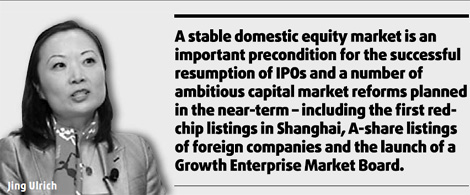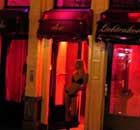Opinion
Moderate credit growth expected
By Jing Ulrich (China Daily)
Updated: 2009-09-07 08:06

The Chinese stock market continued its correction in recent days. Recent economic data for July was reasonably strong, but a sharp fall in bank lending has stoked fears that liquidity could dry up in the second half.
Much of the recent selling has been fueled by concerns about imminent policy tightening.
To boost confidence, officials have repeatedly pledged that they will stick to a proactive fiscal policy and moderately loose monetary policy.
The still-challenging outlook for exports and continued deflation suggest that these assurances are credible for the medium term.
Nevertheless, investors have grown jittery over potential scrutiny of asset price gains and bank lending to ensure that credit flows into the real economy. Many market participants have been surprised by the magnitude of the recent sell-off.
While views on the near-term outlook diverged, domestic institutions offered the following feedback:
Market players associate the surge in lending in the first half with strong liquidity and buoyant equity market performance.
Discounted bills and short-term loans accounted for about one-third of new lending in the first half. As discounted bills mature, Chinese banks are channeling the funds into medium-term and long-term loans.
According to a report from Xinhua News Agency, 1.7 trillion yuan in discounted bills will reach maturity in the second half of 2009.
Domestic mutual funds have been heavily invested in equities.
Some managers have been forced to sell-down their positions under enormous performance scrutiny, and the absence of new fund launches has weighed on the recent demand for equities.
| ||||
Since April, the share of demand deposits as a proportion of total household deposits has edged higher -- a sign that investors are favoring liquid savings products.
In July, the number of new trading accounts opened by individuals reached the highest level since late 2007.
Chinese bank lending will almost certainly moderate through the remainder of the year, reflecting the seasonal tendency of banks to front-load new loans.
However, we expect credit growth to remain adequate to support the government's fiscal policies. Banks have already set aside a certain amount of capital for infrastructure loans in the second half.
The Chinese government could steer the domestic equity market by influencing supply and demand, and also stimulating confidence through market signals.
A stable domestic equity market is an important precondition for the successful resumption of IPOs and a number of ambitious capital market reforms planned in the near-term - including the first red-chip listings in Shanghai, A-share listings of foreign companies and the launch of a Growth Enterprise Market Board.
We believe that in the event of further correction, the Chinese authorities will be prepared to put a floor under stock prices by taking measures such as:
Temporarily limiting the central bank's issuance of short-term notes, which are designed to absorb excess liquidity.
Approving new mutual funds at an accelerated pace to boost liquidity. The Chinese Securities Regulatory Commission recently approved the launch of three new funds after a two-week hiatus.
Eliminating the stamp duty on equity transactions to send a positive market signal.
Following the sharp correction in A shares, a number of dual-listed Shanghai stocks currently trade at a discount to their H-share counterparts, including China Railway Construction (negative 8.1 percent), Ping An Insurance (negative 5.6 percent), China Life Insurance (negative 4.2 percent), China Railway Group (negative 3.6 percent), and Anhui Conch Cement (negative 2.4 percent).
The author is chairman of JP Morgan Securities China. The August 2008 edition of Forbes Magazine put Jing Ulrich on its list of the 100 most powerful women in the world. The April 2009 publication of China's Business Watch Magazine listed her among the country's 25 business women elites.













